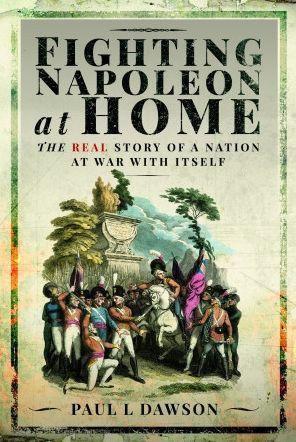Fighting Napoleon at Home: The Real Story of a Nation at War with Itself

Fighting Napoleon at Home: The Real Story of a Nation at War with Itself
The great successes of Wellington and Nelson, and the glamour of Regency London, cover over the cracks of a divided society, of riots across the industrial north and widespread political opposition. Huge swathes of the country hated the war, booed and hissed at soldiers and 'lobbed turds' at the Scots Greys in Halifax. There were repeated 'Peace Petitions' which sought to stop the war - and even to prevent the British Army fighting at Waterloo.
Armed Associations of gentlemen volunteers and Local Militias led the call to close down the debate on social and democratic reform, while on the other hand thousands of English reformers heeded the call from France and hundreds actually headed to France, with many thousands more believing that the time had come, when its young men were needed to fight for King and Country, for reform.
The burgeoning middle class had no vote in parliament; rapidly expanding industrial towns and cities had no MPs, yet small villages - pocket boroughs - often had two. The burden of taxation fell on those least able to afford it; enclosure of common land; corn laws; restrictions on the freedom of expression; the endless killing, all fed into an undercurrent of political dissent that was ideologically opposed to the loyalist cause. It was a battle for the very sole of Britain.
For the first time, the shocking reality of life in Britain, during what is often portrayed as being its greatest era, is told through diaries, letters, and newspaper comments. Fighting Napoleon at Home is a startling portrayal of the society from which the soldiers and sailors were drawn and exactly what it was they were fighting to defend. It will become essential reading for anyone attempting to understand why Britain's aristocracy had to stop Napoleon at any cost and suppress the dangerous ideals of liberté, égalité, fraternité.
PRP: 180.00 Lei
Acesta este Prețul Recomandat de Producător. Prețul de vânzare al produsului este afișat mai jos.
162.00Lei
162.00Lei
180.00 LeiLivrare in 2-4 saptamani
Descrierea produsului
The great successes of Wellington and Nelson, and the glamour of Regency London, cover over the cracks of a divided society, of riots across the industrial north and widespread political opposition. Huge swathes of the country hated the war, booed and hissed at soldiers and 'lobbed turds' at the Scots Greys in Halifax. There were repeated 'Peace Petitions' which sought to stop the war - and even to prevent the British Army fighting at Waterloo.
Armed Associations of gentlemen volunteers and Local Militias led the call to close down the debate on social and democratic reform, while on the other hand thousands of English reformers heeded the call from France and hundreds actually headed to France, with many thousands more believing that the time had come, when its young men were needed to fight for King and Country, for reform.
The burgeoning middle class had no vote in parliament; rapidly expanding industrial towns and cities had no MPs, yet small villages - pocket boroughs - often had two. The burden of taxation fell on those least able to afford it; enclosure of common land; corn laws; restrictions on the freedom of expression; the endless killing, all fed into an undercurrent of political dissent that was ideologically opposed to the loyalist cause. It was a battle for the very sole of Britain.
For the first time, the shocking reality of life in Britain, during what is often portrayed as being its greatest era, is told through diaries, letters, and newspaper comments. Fighting Napoleon at Home is a startling portrayal of the society from which the soldiers and sailors were drawn and exactly what it was they were fighting to defend. It will become essential reading for anyone attempting to understand why Britain's aristocracy had to stop Napoleon at any cost and suppress the dangerous ideals of liberté, égalité, fraternité.
Detaliile produsului










